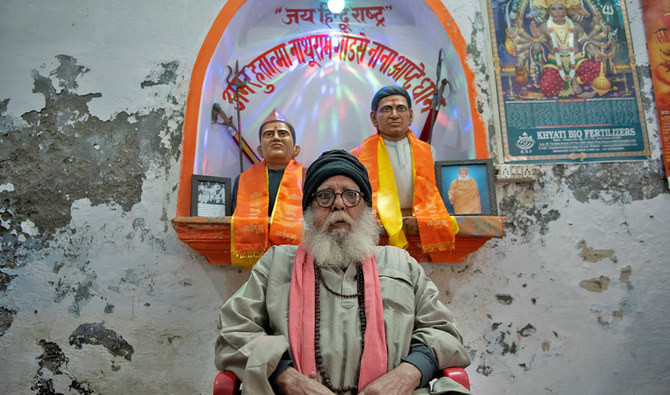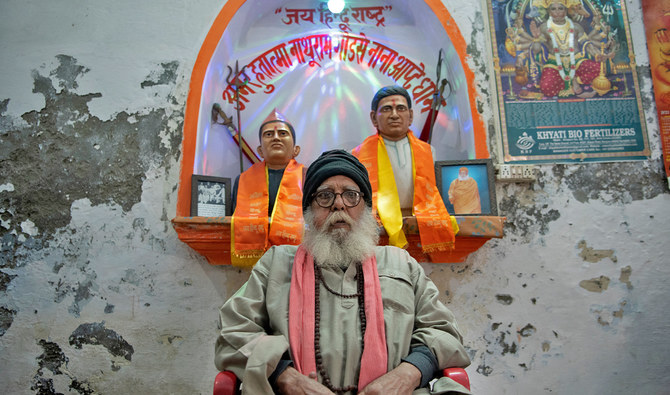MEERUT: Hindu fundamentalist Ashok Sharma has devoted his life to championing the deeds of an Indian "patriot": not revered independence hero Mahatma Gandhi, but the man who shot him dead.
Sharma is the custodian of a temple dedicated to Nathuram Godse, who 75 years ago this Monday on January 30, 1948, gunned down a figure celebrated the world over as an apostle of non-violent struggle.
For generations, the young religious zealot – hanged the following year – was roundly despised as the archvillain of India's long struggle to free itself from British colonial rule.
But since the election of Prime Minister Narendra Modi nearly a decade ago, an alternate history forged in Hindu nationalist ideology has left Sharma no longer a "lone warrior" in worshipping the assassin.
"I was ostracised by everyone, including my family and friends... but today I command respect for being Godse's disciple," he told AFP at his shrine in the bustling city of Meerut, a couple of hours from New Delhi by car.
"There is a wind of change in the country and people have understood that Godse was the real patriot and Gandhi a traitor."
Sharma established his unremarkable temple complex in 2015, a year after Modi took office, after several unsuccessful attempts under previous governments that saw him briefly jailed and his property seized.
Its inauguration was met with outrage and hand-wringing in the press, renewed in 2019 when it marked the anniversary of Gandhi's death with a staged re-enactment of the killing using an effigy that spurted fake blood.
Now the humble shrine, featuring small ceramic busts of Godse and his chief accomplice Narayan Apte, is visited by droves of people – some out of curiosity, but most to pay their respects.
Sharma and his followers hold daily prayers in front of the Godse idol, chanting religious sermons that accuse Gandhi of betraying the nation despite his role in mobilising the mass protests that brought India's independence.
In their view, Gandhi failed to stop Britain's colony from being partitioned into the separate nations of India and Pakistan, thwarting it from becoming a state governed by ancient Hindu scriptures.
"It is because of Gandhi and his ideology that India was divided and Hindus had to bow before Muslims and outsiders," said Abhishek Agarwal, like Sharma a member of the century-old radical Hindu Mahasabha group.

School students scatter flowers on the statue of Mahatma Gandhi on his death anniversary in Hyderabad on January 30, 2023. (AFP)
Agarwal said that Godse was denigrated by post-independence secular politicians in a conspiracy to suppress Hindu beliefs and impose democracy, a concept he claims is alien to local historical tradition.
"But now Gandhi is exposed and Godse's word is spreading far and wide. The secular leaders cannot stop this storm and there will be a time when Gandhi's name will be wiped out from the pious land," he told AFP.
Godse was born in a small Indian village in 1910, the son of a postal worker, and at a very young age joined the Rashtriya Swayamsevak Sangh (RSS), a still-prominent Hindu revivalist outfit whose members conduct paramilitary drills and prayer meetings.
He was 37 years old when he shot Gandhi at point-blank range as the latter emerged from a multi-faith prayer meeting in New Delhi.
At the time, authorities briefly banned the RSS -- despite its leaders claiming that Godse left the organisation before the crime -- but reversed course not long before the killer was executed alongside an accomplice.
Today, the RSS has continued relevance as the ideological fountainhead of the ruling Bharatiya Janata Party (BJP), which it founded to champion Hindu causes in the political realm.
Decades before he became India's leader, Prime Minister Modi's first role in public life was as an RSS cadre.
Modi has regularly paid respect to Gandhi as one of the 20th century's most venerated figures, visiting his spiritual retreat and speaking movingly about his ideals and legacy.
He has refrained from weighing in on efforts by nationalist activists to rehabilitate the legacy of Gandhi's assassin -- to the disappointment of Sharma and his acolytes.
But he has also never explicitly denounced Godse or his ideology, and his government has championed the work of Vinayak Damodar Savarkar, an important Hindu ideologue who served as Godse's mentor and was tried alongside him but acquitted as a co-conspirator in the assassination.
Modi has proved adept at channelling India's growing tide of Hindu nationalism after coming to power in 2014, invoking the glorious past of India's majority religion and promising to end its "persecution".
His departure from the secular values of his predecessors has been watched with dismay by Gandhi's great-grandson Tushar, an author living in Mumbai.
Tushar told AFP that Godse's veneration was the direct result of an ideology espoused by Modi's government that risked sowing the "seeds of our destruction".
"For too long we've been too diplomatic and a bit generous in equating it as nationalism. It's not nationalism, it is fanaticism," he said.
"Our hate will devour us. If we have to survive, then somewhere the venom of hate will have to be expunged."














